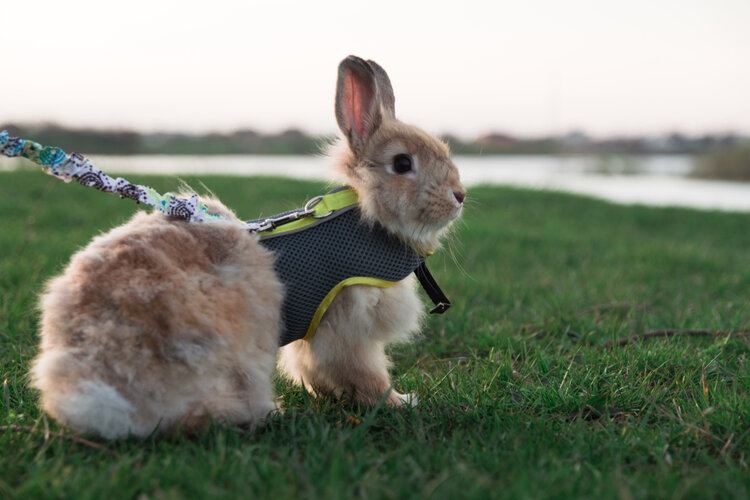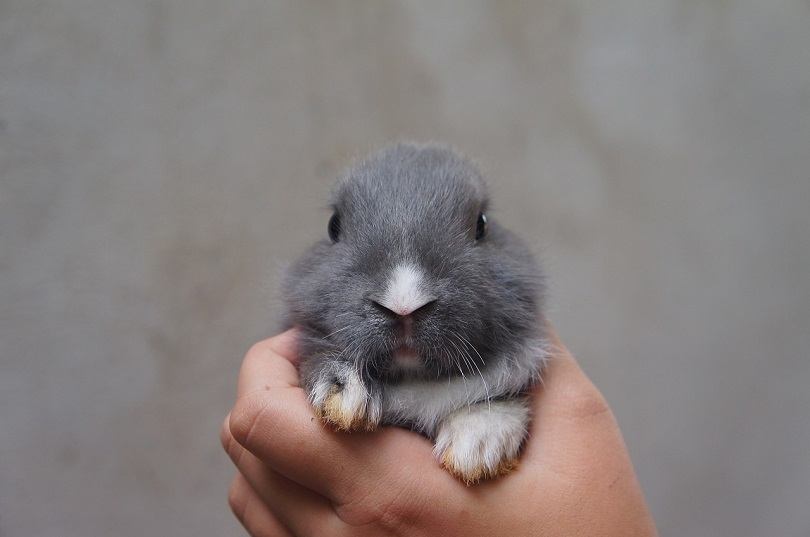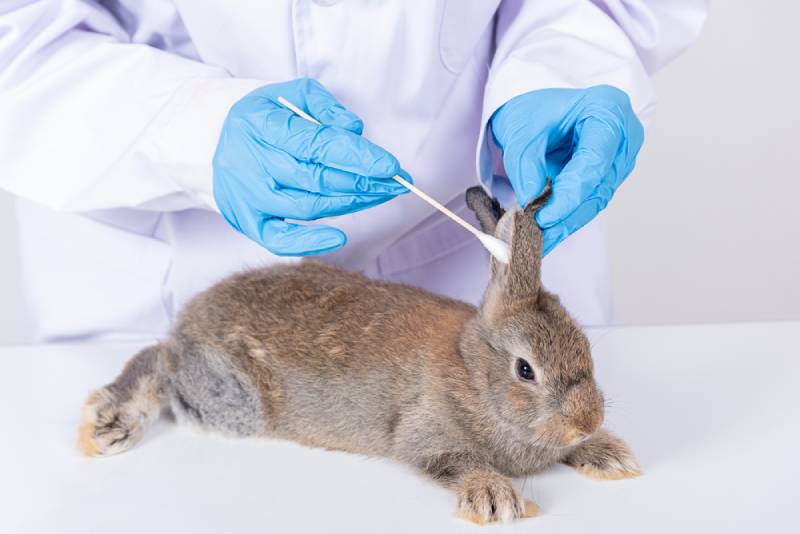
So, you have an adorable rabbit for a pet, and you’ve been wondering if you should start taking them outside for a walk. Dogs tend to wear collars most of the time, as this makes it easier to attach a leash for going on a walk. So, why not your rabbit?
Collars are unsafe for rabbits and you should never use one on your pet. Harnesses can be okay, though, if you can find the right one and ensure that it fits your bunny correctly.
We go over why collars are so dangerous for bunnies and what you can use instead. Your rabbit’s safety is what matters most.

What Is Wrong With Collars for Rabbits?
There are several reasons that collars are not recommended for your rabbit.
First and most importantly, rabbits are easily startled, which can cause them to suddenly bolt. This can lead to your bunny pulling against your hold on the collar and injuring themselves.
Another reason that collars are a bad idea for bunnies is that they can quite easily injure your rabbit when they attempt to get the collar off. Most rabbits will spend time trying to remove the collar and can accidentally get a foot or their mouth stuck inside the collar. If you aren’t around when this occurs, your bunny can become quite panicked, which can cause injury.
Lastly, rabbits have sensitive and thinner skin around their necks, and a collar can wear away your rabbit’s fur around their neck and even can cause abrasions, particularly if the collar is a little tight.
For these reasons, a rabbit wearing a collar is a bad idea.

But What About Breakaway Collars?
We put breakaway collars on our cats and dogs to avoid the strangulation problem, so can it also work for rabbits?
Breakaway collars work by snapping open easily when they get snagged. This prevents an animal from strangling. However, these products are manufactured with the intended species in mind (usually cats) and are made in a way so that an average cat has enough strength to break open the collar. A rabbit might not have such physical strength at their disposal.
If a rabbit were strong enough to break open a collar, there’s also the risk of your bunny escaping. If you are walking your rabbit and something startles them and they lunge away, the breakaway collar could snap open, which will allow your rabbit to run away.
How Can I Provide Identification for My Rabbit?
If you’re thinking about using a collar so you can put identification on your rabbit, a better solution is microchipping.
Your vet will place the microchip with a needle under your rabbits’ skin, in between the shoulder blades. The procedure is usually painless and can cost $20 to $45, depending on where you get it done.
If your bunny ever gets outside and is picked up by someone who takes them to a veterinary clinic or humane society, they can scan your pet. The microchip will give them your information, and they can get in touch with you to arrange for you to pick up your pet.
The cost of the microchip isn’t much more than a high-quality collar, and it’s a much better and safer option.

How About a Bell?
Some people might want the collar to place a bell on it, which can help them keep tabs on their bunny. This way, you have an idea where they are in the house.
However, a bell isn’t something that your rabbit will enjoy wearing. They have sensitive ears, and to hear a bell constantly ringing while they move is highly annoying! It also won’t help you find them when they’re resting.
Your best bet is to have your bun contained in a rabbit-safe room or part of the house and just check in on them from time to time.

The 2 Kinds of Harnesses Okay for Rabbits
Harnesses are definitely a better option for your rabbit. But a harness shouldn’t be worn constantly; it should only be placed on your rabbit for walks or other outdoor activities. They should also only be considered an option for rabbits that are accustomed to them, as not all rabbits are used to harnesses. If your rabbit isn’t comfortable with a harness, they should not be placed in one, and instead, they should be placed in a secure pen when outdoors.
The harness must fit your rabbit, or your rabbit could escape or can risk injury. If it’s too loose, your rabbit can either slip out of it, chew through it, or even get a foot stuck inside. If it’s too tight, it will stress your pet out and can prove uncomfortable or may even lead to skin issues. You should be able to slip one to two of your fingers between the harness and your bunny.
There are two different kinds of harnesses that are considered safe for your rabbit to wear.
1. H-Harness

The H-harness is one of the most popular harnesses for rabbit owners. They fit around your rabbit’s neck and waist, which distributes the pressure along your rabbit’s body instead of just on their neck, like the collar. There are buckles at both the neck and waist, which can enable you to tighten or loosen it, depending on your bunny.
2. Vest or Coat Harness

This harness looks exactly how it sounds: It fits like a little vest on your rabbit. Many of these harnesses are fastened with Velcro at the neck and waist (although some might come with snaps or buttons). Always double-check the fastenings, and if the buttons start to become loose or the Velcro starts to lose its stickiness, it’s time for a new harness.
Harnesses to Avoid
Figure-8 harnesses or harnesses that don’t properly secure your rabbit around their back, neck, and underside should be avoided. Shoulder harnesses should only be used by extremely calm, well-trained rabbits and are not advised for rabbits that are being introduced to a harness.

Walking Your Rabbit
Rabbits are dissimilar from cats and dogs. Cats and dogs are predators, and rabbits have been prey animals for centuries, so walking a rabbit will not be the same.
If you’ve decided to start walking your bun, there are a few considerations that you need to think about.
First, not all rabbits will take to walking and it shouldn’t be enforced. They need to be comfortable wearing a harness first.
Second, you should be aware that it won’t really be a walk, but rather more of a meandering. You need to follow your rabbit, and never pull or drag them while they’re on a leash. A rabbit’s leash should be relatively long and not taut or short. It is best to introduce rabbits to leash early on to ensure the odds of success.
If your rabbit becomes stressed during the walk, you should pick them up immediately, calm them down, and take them back home. All in all, walks aren’t necessary for your rabbit. Having them in a harness and leash while in an outdoor rabbit-safe area might be all they need.

Conclusion
Harnesses are okay for your rabbit to wear after training them. It will take time for your bun to get used to wearing a harness, and even taking them outside might be scary for you both.
Always keep them under supervision while in the harness, and give them time to explore the outdoors. Be sure to always be on alert: Look out for any cats or dogs in the neighborhood or any birds of prey coming from above.
Don’t forget to consider microchipping your bunny. It’s a much better option than a collar and will give you peace of mind.
Featured Image Credit: Shadura Andrey, Shutterstock










